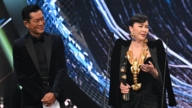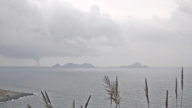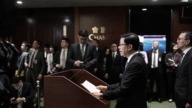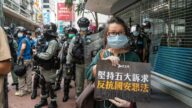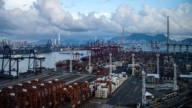【新唐人2011年8月6日讯】中宣部旗下的“中国记协”,8月1号在北京举办座谈会,主题是,“从窃听丑闻看西方新闻观的虚伪本质”。不过,学者指出,西方新闻自由受到法律的保障和制约,而中国的媒体却由某个部门掌握生杀大权。
《人民日报》8月2号大篇幅刊载了与会者的发言,座谈会召集了在北京的新闻界、新闻研究机构,以及高校新闻院系约60多人参与。
会议上,《人民日报社》国际部主任吕岩松发言说,“我们所讲的新闻自由,是一种被赋予“政治使命”的自由。”
《北京青年报社》社长张延平说,“我国媒体一定要认清媒体是“党”的舆论阵地的特有属性”。
《新华社》原副社长马胜荣则表示,《世界新闻报》的窃听丑闻正体现了西方一些媒体对“新闻自由”的滥用。
而中国艺术研究院学者吴祚来向《新唐人》表示,西方媒体是无冕之王,受到法律的保障,但是他们如果违反新闻道德,也将受到法律的制约。
吴祚来:“西方的媒体是有问题的,比如窃听事件有很大问题,但关键是他们社会能够通过一些方式,通过法律能够纠正这样一些错误。就是说,公权力,媒体的一些权利都是能够得到纠正的。因为他们有独立的法律来制约这些媒体的权利或公权力。”
但是中国的媒体却完全受制于中宣部。而这个部门却不受任何力量的制约和管理。
吴祚来:“他们想要封杀一个媒体,就可以封杀一个媒体,他们想控制一个人的言论,就可以控制一个人的言论。这是很大的一个问题。新闻界参加座谈会的领导,他们很难回答这样一个问题。他们上面想怎样指示他,他们就得服从命令。但媒体应该是人民的声音,应该公开公正。”
《法国国际广播电台》评论认为,在微博等新技术条件下,传统的新闻禁令管制办法受到冲击,造成中宣部为首的舆论管制体系很强的紧迫感。一方面,许多新闻当事人在微博上即时发布消息,使针对传统媒体的管制难以奏效;而新闻从业者常将收到的管制禁令在微薄上发布,或将被宣传部禁止发布的稿件在网路发布,更使以新闻禁令为基础的管制体系千疮百孔。
在座谈会召开之前的7月29号晚上,中共中央宣传部接连向全国各大媒体发出几条指令,要求对温州动车事故的报导迅速降温,原因是“海外舆情日趋复杂”,并要求除了引用权威机构的报导外,对动车事故一律不再报导和评论。迫使为动车事故做“头七”悼念报导的各大媒体连夜撤版。在大陆五大门户网站的新闻中心页面上,动车事故消息从要闻栏目中集体消失。
香港的中国问题分析员李崇光通过《德国之声》表示,中宣部既是一个意识形态部门,也是一个特殊利益部门。中共由于意识形态的利益而需要设立这一部门,因此这一部门也就成了一大批官僚的饭碗。中宣部作为政权的意识形态部门,其权力某种程度上已类似于前苏联的“克格勃”,只不过前者是在宣传领域,后者则是在秘密警察领域而已。
新唐人记者秦雪、萧宇采访报导。
====
CCP Criticizes Western Press Freedom
China Journalists’ Association, which is the Chinese
Communist Party’s (CCP) propaganda department
held a symposium in Beijing on Aug. 1 with the theme
“Exposing the Western Press’s Hypocrisy,
Perspectives from the Tapping Scandal."
Scholars say that Western press freedom is protected and
sanctioned by law,
but the media in China are controlled by
the CCP’s propaganda department.
On Aug. 2, the CCP’s mouthpiece People’s Daily published
in a great length the remarks of the symposium participants.
Over 60 people from press research organizations and college
journalism departments attended the symposium.
Lü Yansong, director of People’s Daily international
department said, “The press freedom we refer to
is a kind of freedom of ‘political mission’."
Zhang Yanping, president of the Beijing Youth Daily, said,
“Journalists in China must understand that the media
is a characteristic of the Party’s propaganda frontline."
Ma Shengrong, former vice president of Xinhua News Agency
said, News of the World tapping scandal embodied
the fact that some Western media abused “press freedom."
But, Wu Zuolai, a scholar of China Art Research Institute
told NTD that Western media is the uncrowned king.
It is protected by the law.
However, if they violate the press ethics,
they will also be punished by law.
Wu Zhuolai: “Problems do exist in Western media,
e.g., the problem of the tapping incident is very severe.
However, the Western society can correct such issues by law.
The rights enjoyed by the media can be rectified,
because there are independent legal systems
to restrict the abuse of the power of media."
However, the media in China is totally under the control of
the CCP’s propaganda department,
which is beyond any restriction or monitoring.
Wu Zhuolai: “They can block any media
and censor any public opinion at will.
This is a serious problem, which cannot be easily answered
by the media people attending the symposium.
They have to follow their superiors’ instructions.
However, the media is supposed to be a voice for the people
and should be open and impartial."
Radio France Internationale commented that
new communication technologies like micro-blog have
created a great challenge to the traditional media censorship,
putting a lot of pressure on the CCP’s media censorship system.
Many people release news by themselves on micro-blog,
rendering the traditional media censorship ineffective.
Also, some journalists often publicize the censorship order
on micro-blog or publish censored articles online,
making the CCP’s top-down press monitoring system
based on censorship orders more vulnerable to public scrutiny.
On July 29, before the symposium was held,
the propaganda department ordered all major Chinese media
to quickly cool down on the reports of Wenzhou train crash.
The reason was “the overseas media are getting complicated."
They request all media to not report on the train accident and
cite only the official press releases on the incident.
This ban forced the newspapers to take down the articles
commemorating the crash victims.
The news articles on the crash were removed from websites.
Li Chongguang, a China analyst in Hong Kong,
told Deutsche Welle that the CCP’s propaganda department
is not only a department of ideology,
but also a department of vested interests.
For its own ideological interests, the CCP set it up.
It has become a “rice bowl" of a large number of bureaucrats.
As an ideological department of the CCP, its power resembles
the spy agency KGB of the former USSR.
The difference is that the former is in the propaganda field,
while the latter was in the secret police area.
NTD reporters Qin Xue and Xiao Yu.


